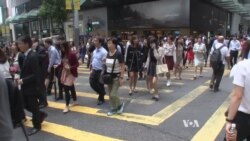While the pro-democracy protests in Hong Kong are primarily about the right to vote without China first vetting the candidates, anxiety about the rising cost of living and the growing wealth gap in the city are also contributing factors. Many on the street believe political change is needed to address these concerns, especially after the city's chief executive suggested that democracy would be bad for the economy.
The staff and volunteers at the Feeding Hong Kong food bank distribute enough food to make 29,000 meals a month, to help feed some of the one million people here living below the poverty line.
Gabrielle Kirstein, who founded the organization in 2009, said while Hong Kong is not dealing with issues like starvation, the number of poor people is rising.
“What we have is one in three seniors, one in four, one in five students, children that are living below the poverty line that are struggling to get three healthy nutritious meals a day,” said Kirstein.
Hong Kong’s low-tax, business friendly government has created a vibrant economy, but it has also created one of the world's biggest wealth gaps between the rich and poor.
The pro-democracy supporters that have shut down traffic the city's commercial centers have been focused on gaining voting rights without interference from China.
But many say the lack of democracy in Hong Kong is the reason the government has not done more to address the economic concerns of the working poor and middle class.
Fernando Cheung with the Labor Party, a member the Hong Kong Legislative Council, is among those who see the political system as responsible for the plight of the poor being ignored.
“They are not even responding in the positive manner which could be traced to the very structure of the political system here in Hong Kong because after all, the chief executive is not even elected by the general public,” said Cheung.
On the same day the government and protesters sat down for talks to resolve the current crisis, chief executive Leung Chun-ying suggested democracy would give too much power to the poor.
Councilman Cheung said the chief executive's comments reflect more the interests and viewpoint of his supporters in Beijing than the people of Hong Kong.
“They have a lot of economic interests in Hong Kong and they don't want their economic interests to be jeopardized and I think more fundamentally I think [it shows] the central government distrust of people,” said Cheung.
While most of the student protesters are not living in poverty, they are concerned about rising property prices and stagnant wages. Jenny Lau thinks a democratically elected government would do more to address the wealth gap.
“If Occupy Central, they made the change, I think it would make that situation better,” said Lau.
But these activists are not advocating radical changes. They say democracy in Hong Kong could address the wealth gap without threatening its free market capitalist economy.






